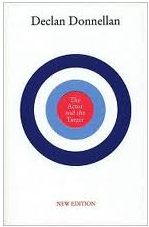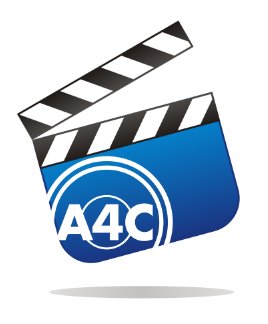Next time you have a fight or even aslightly confrontational moment with your significant other, your roommate orthe grocer down the street, observe something for me. Then watch the same thing on TV and in film and tell me why they are so often polar opposites….
Whenever my partner and I fight over something, I have noticed that we barely look each other in the eye. For sometimes up to an hour we could avoid eye contact, usually making eye contact only when the otherperson is speaking. I’m not saying it goes ‘Look away, look away, look away,stop talking, stare, stare, stare’. No. But the majority of the time during a confrontation, I look when I’m listening and don’tlook when I’m talking. What do youdo?
Now what do actors do? Tom Stoppard, in his play, Rosencrantz andGuildenstern Are Dead, wrote “We’re actors, we’re the opposite of people!” and,in a number of ways, he hit the nail right on the head. So much of what we doas actors is accepted artifice, not genuine reality. It stems sometimes from necessary on-set practicality or expediency, but oftentimes from lack of preparation, ignorance, laziness and sometimes just plain absence of everyday human observation.
We have accepted the behaviour of actors onstage and screen for so long now that their performances seem more representative of life, than life itself. The sound of a gunshot onscreen is nothing like in real life yet we acceptthat it is after hearing three million versions of it on screen. Comparatively, the splintering, tinny crack that marks an actual gunshot sounds as unnaturalto us as the actual sound of a fist hitting a jaw in real life. When your only experience of these things comes from TV and film, it is impossible to accept that – in real life – a punch does not sound like a mallet hitting a slab of tenderloin, it is actually very quiet. In a lot of cases,one punch is the end of most conflicts, despite what James Bond and Vin Diesel might have us think and yet films will fill ten minutes of men walloping each other and barely breaking a sweat. When someone points a gun in real life, you do not hear the sound of click-click-clack that you do on TV and film. Why would a fully automated Glock with almost no moving parts make the sound of metal clicking and grating on metal, or – worse still – why would it make the sound of a pistol being cocked? And yet, in TV and Film Land, it does….
With inconsistencies like this being swallowed by audience members every day in cop shows and action films, why would we be any pickier about actors palming faux human behaviour off onto us? Well, because most of us (thankfully) stay well away from punches and gunshots in real life, but interactions with human beings are almost impossible to avoid. As such, the ridiculous SFX added over a rifle being aimed may not surprise you, but the following should (and I believe, do) leave us scratching our heads…
When was the last time you watched a scene where two people stood (or sat) in the middle of a room, face-to-face,a foot apart from one another, and just spoke at each other for three full minutes? Well, if you didn’t consciously notice, I’m sure your unconscious mind said: ‘Huh? Why are they – OH! It ain’t real’ and then sat back from some mind-numbing un-reality. As a part of my job I see a lot of film and TV, and this scenario is unfortunately more commonplace than unusual. If you haven’t noticed, the close-up hid the trick. Now when was the last time you did that in reality? Face-to-face? With full eye contact? If you said ‘I do it all the time’, I call shenanigans. Studies have shown that human beings look each other in the eye as little as 15% of the time when they are communicating, preferring to take pressure off communication. Actors, on the other hand, have been trained to pursue their objectives so furiously that the percentage is more like 99% eye contact. It just ain’t real.
 What about a scene where someone is trashing their own apartment in search of an ‘important’ thumb drive? Vases are smashing, trinkets are being crushed underfoot, clothes are flying, paperwork is scattering around the room. In their own apartment. Er, yeah right. Firstly,this is the least likely way to yield the result the character is shooting for, and secondly, it fails to establish any personal relationship with the objects being ransacked. So why do they adorn the apartment in the first place? They now appear as props in a show rather than possessions of value to the protagonist. There is no doubt that sometimes we are so desperate that we almost don’t care about anything else. But if one of those objects was the only remaining photograph of your deceased father, or an irreplaceable copy of The Beatles White Album –or even your essay that is due in two days – you won’t just scatter them to the four corners of the earth, I don’t care how ‘important’ that goal is. Further, if you established a relationship with these objects and still chose to destroy them, it would prove even more how important your goal is.
What about a scene where someone is trashing their own apartment in search of an ‘important’ thumb drive? Vases are smashing, trinkets are being crushed underfoot, clothes are flying, paperwork is scattering around the room. In their own apartment. Er, yeah right. Firstly,this is the least likely way to yield the result the character is shooting for, and secondly, it fails to establish any personal relationship with the objects being ransacked. So why do they adorn the apartment in the first place? They now appear as props in a show rather than possessions of value to the protagonist. There is no doubt that sometimes we are so desperate that we almost don’t care about anything else. But if one of those objects was the only remaining photograph of your deceased father, or an irreplaceable copy of The Beatles White Album –or even your essay that is due in two days – you won’t just scatter them to the four corners of the earth, I don’t care how ‘important’ that goal is. Further, if you established a relationship with these objects and still chose to destroy them, it would prove even more how important your goal is. Think about it. The reason why it appears we have no relationship with these objects is because… we have no relationship with these objects. Every actor has at some time done a drama exercise using their own belongings and every actor has, at sometime, done a similar class exercise using a box of props. You know the difference. Why don’t you act the difference as well? Get on set before you are called, define those props during rehearsals on stage or, better still, choose them with the prop supervisor or set designer. The difference is massive and well worth the effort, believe me.
 One of my favourite ‘Actors: The Opposite of People” moments – on stage or screen – iswhen the actor ‘loses it’. For many actors, accepting a good role is simply hiring a trusty porter to bear emotional baggage, and ‘losing it’ is the requisite climax of the catharsis. ‘Emily’ is a timid librarian. She lives alone, has few friends; tends to her ailing mother and incontinent cat. Her mother treats her like garbage, she is underappreciated at work and the cat regularly poops in her shoes out of jealousy for the attention she gives her mother and career. Being a ‘good’ person though, she never gets angry. She just keeps it all inside. Picking up the poop and practicing breathing exercises, at work, Emily releases herself deeper into the comforting embrace of the Dewey System. But one day, Emily has had enough! So what does an actor do with this moment of Emily ‘losing it’? Commonly, this shy, timid, pacifistic character becomes – momentarily, at least – a tigress. (The equivalent of the teen flick where the wallflower takes of her glasses, lets her hair down and becomes a sex-bomb on the dance floor). WTF?! Where on earth did that come from? It’s BS and you know it. Even if you don’t consciously admit it to yourself, you know it. No-one ever 100% loses it. No-one, let alone Emily. Trust me. Even actors, who love to feeeel in front of other people still have insecurity that holds back some of their real feelings. Despite the brain-washing of countless episodes of TV shows that attempt to convince us otherwise, real people never let go 100%. Look at your family, look at your boss, your partner and yourself. You know to be true. We always hold something back. Especially timid, reserved wallflowers.
One of my favourite ‘Actors: The Opposite of People” moments – on stage or screen – iswhen the actor ‘loses it’. For many actors, accepting a good role is simply hiring a trusty porter to bear emotional baggage, and ‘losing it’ is the requisite climax of the catharsis. ‘Emily’ is a timid librarian. She lives alone, has few friends; tends to her ailing mother and incontinent cat. Her mother treats her like garbage, she is underappreciated at work and the cat regularly poops in her shoes out of jealousy for the attention she gives her mother and career. Being a ‘good’ person though, she never gets angry. She just keeps it all inside. Picking up the poop and practicing breathing exercises, at work, Emily releases herself deeper into the comforting embrace of the Dewey System. But one day, Emily has had enough! So what does an actor do with this moment of Emily ‘losing it’? Commonly, this shy, timid, pacifistic character becomes – momentarily, at least – a tigress. (The equivalent of the teen flick where the wallflower takes of her glasses, lets her hair down and becomes a sex-bomb on the dance floor). WTF?! Where on earth did that come from? It’s BS and you know it. Even if you don’t consciously admit it to yourself, you know it. No-one ever 100% loses it. No-one, let alone Emily. Trust me. Even actors, who love to feeeel in front of other people still have insecurity that holds back some of their real feelings. Despite the brain-washing of countless episodes of TV shows that attempt to convince us otherwise, real people never let go 100%. Look at your family, look at your boss, your partner and yourself. You know to be true. We always hold something back. Especially timid, reserved wallflowers. Declan Donnellan (author of The Actor and the Target) wrote: “Expressing yourself through words is like knitting a scarf with tree trunks”. Words, he believes are woefully inadequate at expressing how we truly feel. Rather than this being a problem for the actor, it is the actors one true gift. We don’t know what to say. We don’t know how to say it. Expression is a difficult thing, and ain’t that grand! Otherwise, everyone would do it and there’d be no reason to watch actors attempt to do it better on stage or screen.
Declan Donnellan (author of The Actor and the Target) wrote: “Expressing yourself through words is like knitting a scarf with tree trunks”. Words, he believes are woefully inadequate at expressing how we truly feel. Rather than this being a problem for the actor, it is the actors one true gift. We don’t know what to say. We don’t know how to say it. Expression is a difficult thing, and ain’t that grand! Otherwise, everyone would do it and there’d be no reason to watch actors attempt to do it better on stage or screen. Now back to Emily. After thirty years of being downtrodden, mistreated, disrespected andviolated, of course she’s going to have a boiling core of molten lava ready to spew forth when cracks appear in her protective surface, but will it shoot into the air continuously and maliciously for a year, systematically killing everything in its radius? Or will is explode initially to the east, aimlessly splutter here and there unpredictably, and then dribble out the sides, ruining some good buildings in the east, but leaving others entirely unscathed, eventually settling for another 400 or so million years of dormancy? Why should our understanding of human beings be less astute than our observation of forces in nature?
 Emily freely and coherently expressing herself – given her emotional history – would be akin to Woody Allen, during a mugging, destroying his opponent with Ultimate Fighting moves. Even if Woody studied every Kimbo Slice and Anderson Silva move on cable for a decade, he would still be incapable of such feats. He might try, sure. He may even succeed at actually defending himself, but his effort will look less like Anderson Silva and more like the Star Wars Kid, on Youtube. So too, our dear, slighted, under-appreciated characters, need to obey the laws of nature when they grace our stages and screens.
Emily freely and coherently expressing herself – given her emotional history – would be akin to Woody Allen, during a mugging, destroying his opponent with Ultimate Fighting moves. Even if Woody studied every Kimbo Slice and Anderson Silva move on cable for a decade, he would still be incapable of such feats. He might try, sure. He may even succeed at actually defending himself, but his effort will look less like Anderson Silva and more like the Star Wars Kid, on Youtube. So too, our dear, slighted, under-appreciated characters, need to obey the laws of nature when they grace our stages and screens.Be honest withyourself, be honest with your character and be honest with the audience. Actors are quite often the opposite of people, but it need not be the case. Or as James Dean once told Dennis Hopper: “Don’t ‘act’. If you’re smoking a cigarette, smoke it. Don’t act like you’re smoking it”. When you live truthfully and let the BS fall away, it’s really a lot simpler than you may believe.
=pb=
(The blogs you see on www.acting4camera.com are free, but they don’t write themselves. If you find the information useful, feel free to donate below to keep them coming. Your contribution of any amount is graciously welcomed!)







